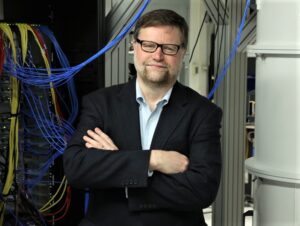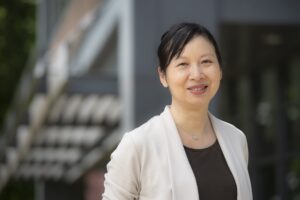Bob Sutor, University at Buffalo, USA
Title
Considerations for Networked Quantum Processing
Abstract
For all our vast experience over several decades, classical networking is “easy” compared to the quantum version. In this talk, we will discuss the basic principles of quantum computing and devices and talk about how basic notions such as superposition and entanglement must be preserved locally and globally. There has been much industry conversation about the meager number of qubits we have available today and the amazing but only promised use cases breakthroughs that we all await. Without significant work on the technology in the middle, we may never reach the quantum advantages we seek.
Bio
Dr. Bob Sutor has been a technical leader and executive in the IT industry for over 40 years.
Bob’s industry role is to advance quantum technologies by building strong business, partner, technical, and educational ecosystems. The singular goal is to evolve quantum to help solve some of the critical computational problems facing society today. Bob is widely quoted in the press, delivers conference keynotes, and works with industry analysts and investors to accelerate understanding and adoption of quantum technologies.
Sutor is now Vice President and Chief Quantum Advocate at Infleqtion / ColdQuanta, a hardware and software company working on quantum computing and sensing. He is also an Adjunct Professor in the Department of Computer Science and Engineering at the University at Buffalo (New York, USA).
More than two decades of Bob’s career were spent in IBM Research in New York. During his time there, he worked on or led efforts in symbolic mathematical computation, optimization, AI, blockchain, and quantum computing. He was also an executive on the software side of the IBM business in areas including middleware, software on Linux, mobile, open source, and emerging industry standards.
Bob is a theoretical mathematician by training, has a Ph.D. from Princeton University, and an undergraduate degree from Harvard College.
He’s the author of a book about quantum computing called Dancing with Qubits which was published in 2019. He is also the author of the 2021 book Dancing with Python, an introduction to Python coding for classical and quantum computing.
Hongyi “Michael” Wu, University of Arizona, USA
Title
Neural Backdoor in Future Deep Learning Models: Challenges and Solution
Abstract
Deep learning has gained widespread adoption and pervaded numerous applications that directly impact people’s daily lives. While recognized as a crucial tool for boosting efficiency and productivity, it has also become an attractive target for cybercriminals. The indiscriminate proliferation of deep learning technologies and applications has led to vulnerabilities, opening the door to new forms of cyberattacks. Despite the notion of an AI takeover or robot rebellion being relegated to the realm of science fiction, today’s deep learning systems face immediate security concerns. For instance, many deep learning models can be poisoned, Trojanized, or implanted with backdoors. Such attacks can compromise the integrity and reliability of deep learning, potentially leading to harmful consequences. This talk will scrutinize the latest research at the nexus of deep learning and security, particularly neural backdoor attacks, defense, and their implications. The talk will delve into recent solutions crafted by researchers, with the aim of stimulating novel ideas for the future advancement of this field and its potential impact on safeguarding deep learning technologies.
Bio
Hongyi “Michael” Wu is a Professor and Department Head of Electrical and Computer Engineering at the University of Arizona. He received his B.S. degree in Scientific Instruments from Zhejiang University, Hangzhou, China, in 1996, and subsequently obtained his M.S. degree in Electrical Engineering and Ph.D. degree in Computer Science at the State University of New York (SUNY) at Buffalo in 2000 and 2002, respectively. His current research focuses on security and privacy in intelligent computing and communication systems. He has been a PI or Co-PI for more than 50 projects which have received over $24M in funding from various sources, including the NSF, NSA, DOD, DOE, NATO, State governments, and industry partners. He has published over 160 technical articles in journals and conference proceedings and acquired a US patent. He has chaired several conferences, including the prestigious IEEE Infocom 2020. He has also served on the editorial board of several journals, including as a Lead Topic Editor of IEEE Transactions on Computers (2023-now), an Area Editor for IEEE Internet of Things Journal (2022-now), and an Associate Editor for IEEE Transactions on Computers (2022-now), IEEE Transactions on Mobile Computing (2018-now), IEEE Internet of Things Journal (2014-2018), and IEEE Transactions on Parallel and Distributed Systems (2013-2016). He has received several awards and honors throughout his career, including an NSF CAREER Award in 2004, the UL Lafayette Distinguished Professor Award in 2011, the IEEE Percom Mark Weiser Best Paper Award in 2018, and the UB CSE Distinguished Alumni Award in 2022. He is a Fellow of IEEE.
Yingying (Jennifer) Chen, Rutgers University, USA
Title
AI-Driven Efficiency and Security in Edge Sensing and Computing: Advancements, Vulnerabilities, and Opportunities in Smart-X Devices
Abstract
The pervasive usage of edge devices, also called Smart-X devices, such as IoT devices, smartphones, AR/VR headsets, delivery drones, and autonomous vehicles, has experienced a notable upward trend. This trend offers unprecedented opportunities for on-device intelligence and a wide range of edge sensing and computing applications. Artificial Intelligence (AI) has emerged as a key enabler enhancing the efficiency of these emerging applications, including AR/VR applications, intelligent audio assistant systems, and in-baggage dangerous object detection, while also providing enhanced security. However, the increasing reliance on AI also introduces inherent security vulnerabilities, which pose significant threats when deploying these applications in real-world environments. This talk aims to discuss recent advancements in AI-enabled edge sensing and computing achieved through hardware-software co-design and on-device AI, highlighting their significant contributions to achieving efficient inference. Additionally, it will delve into the exploration of new attack surfaces, such as adversarial attacks and backdoor attacks, that arise with the integration of AI. Case studies of AR/VR applications and intelligent edge-based audio systems will be presented to illustrate these concepts. Furthermore, the talk will explore novel opportunities, such as domain invariant modeling, which leverage AI to enhance efficiency and bolster security defense in Smart-X devices, thereby advancing next-generation edge sensing and computing capabilities.
Bio
Yingying (Jennifer) Chen is a Professor and Department Chair of Electrical and Computer Engineering (ECE) and Peter Cherasia Endowed Faculty Scholar at Rutgers University. She is the Associate Director of Wireless Information Network Laboratory (WINLAB). She also leads the Data Analysis and Information Security (DAISY) Lab. She is a Fellow of IEEE and a Fellow of National Academy of Inventors (NAI). She is also an ACM Distinguished Member. Her research interests include Applied Machine Learning in Mobile Computing and Sensing, Internet of Things (IoT), Security in AI/ML Systems, Smart Healthcare, and Deep Learning on Mobile Systems. She is a pioneer in RF/WiFi sensing, location systems, and mobile security. Before joining Rutgers, she was a tenured professor at Stevens Institute of Technology and had extensive industry experiences at Nokia (previously Lucent Technologies). She has published 3 books, 4 book chapters and 240+ journal articles and refereed conference papers. She is the recipient of seven Best Paper Awards in top ACM and IEEE conferences. She is the recipient of NSF CAREER Award and Google Faculty Research Award. She received NJ Inventors Hall of Fame Innovator Award and is also the recipient of IEEE Region 1 Technological Innovation in Academic Award. Her research has been supported by many funding agencies including NSF, NIH, ARO, DoD and AFRL and reported in numerous media outlets including MIT Technology Review, CNN, Fox News Channel, Wall Street Journal, National Public Radio and IEEE Spectrum. She has been serving/served on the editorial boards of IEEE Transactions on Mobile Computing (TMC), IEEE Transactions on Wireless Communications (TWireless), IEEE/ACM Transactions on Networking (ToN) and ACM Transactions on Privacy and Security (TOPS). For more information, please refer to her homepage at: http://www.winlab.rutgers.edu/~yychen/.





